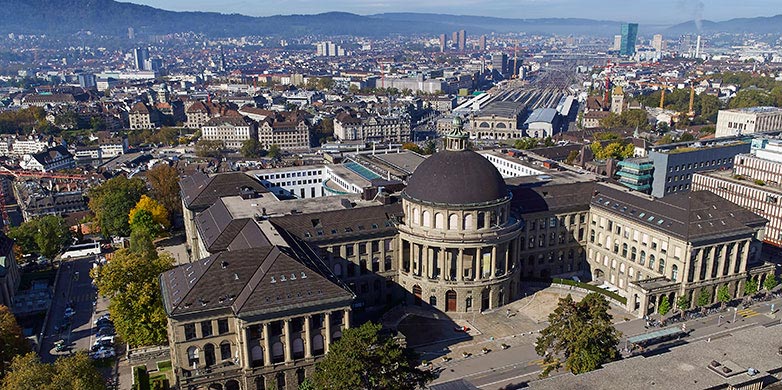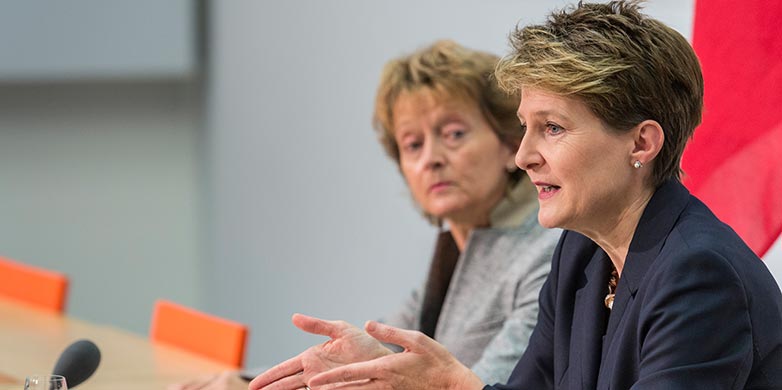Relieved about rejection of Ecopop
Senior representatives of Swiss universities are initially relieved about the clear rejection of the Ecopop initiative on the weekend. At the same time, they are aware that the implementation of the mass immigration initiative comes with a great deal of imponderabilities for Swiss universities.
The Federal Council noted with satisfaction on Sunday that the Swiss electorate rejected the Ecopop initiative (‘Stop overpopulation to protect the natural resources’) with a resounding majority, Simonetta Sommaruga, the head of the Federal Department of Justice and Police, told the media on Sunday. All cantons and 74.1 per cent of the electorate rejected the initiative.
‘I am relieved about the unexpectedly clear result’, said ETH President Ralph Eichler. ‘ETH Zurich is now a global magnet for students and researchers. Excessively strict immigration restrictions would put our competitiveness at risk.’ According to the text of the Ecopop initiative, Switzerland would have needed to limit immigration to no more than 0.2 per cent of its permanent resident population. Such a quota would have made it difficult for internationally integrated universities like ETH Zurich to recruit foreign top and grassroots researchers.
The Association of Students at ETH Zurich (VSETH) was pleased on Sunday (Facebook): ‘Ecopop was clearly rejected and we are delighted that there are no consequences for us or ETH.’
Concerning the question about whether the result of the vote will have an impact on the mass immigration initiative, Federal Councillor Simonetta Sommaruga said: ‘Even if there are similarities in terms of the contents between the Ecopop initiative and the mass immigration initiative, the result of 9 February is not put in doubt by today’s vote.’ According to the constitutional mandate of 9 February, Switzerland must limit the number of residence permits with maximum figures and quotas as of 2017. The draft act will now be forwarded for consultation in December.
Concerns of the research community
As regards the implementation of the mass immigration initiative, Ralph Eichler and his successor as of 2015, Lino Guzzella, confirm that the concerns of the universities and science must be taken into account. Furthermore, full association with the European education and research programmes Erasmus+ and Horizon 2020 remains the clear objective.
The President of the ETH Council, Fritz Schiesser, draws a similar conclusion in his comment on the vote: ‘Just the implementation of the mass immigration initiative is already causing major problems for the ETH area. We need to ensure that Switzerland remains involved in the European research zone and that ETH, EPFL and the research institutions can also recruit their top scientists from abroad. This is the only way the ETH domain can fulfil its mandate in the service of Switzerland in the future.’
Martin Vetterli, the President of the Research Council of the Swiss National Science Foundation (SNSF), notes in a memo that he is delighted that the ‘no’ at the weekend will not make it even more difficult or even impossible for the researchers in Switzerland. At the same time, he warns against thinking oneself safe all too soon: ‘The research centre Switzerland hasn’t won yet. It was merely possible to avert further damage. We will continue to be committed to an open Switzerland, because openness, international collaboration and networking are major factors of our country’s success.’
Next step: partial association
In January the Federal Council will debate about how it aims to negotiate with the EU on the free movement of persons, said Simonetta Sommaruga. Sunday’s result will not change anything regarding the meetings with Brussels: ‘Since 9 February we have a mandate to negotiate with the EU about the agreement on the free movement of persons.’
Next on the agenda in December is the signing of the partial association in Horizon 2020, provisionally agreed in September. The time-limited partial association allows researchers from Switzerland to participate in different ways in the individual instruments of Horizon 2020 until the end of 2016.


